【BBC六分钟英语】如何提出正确的问题?
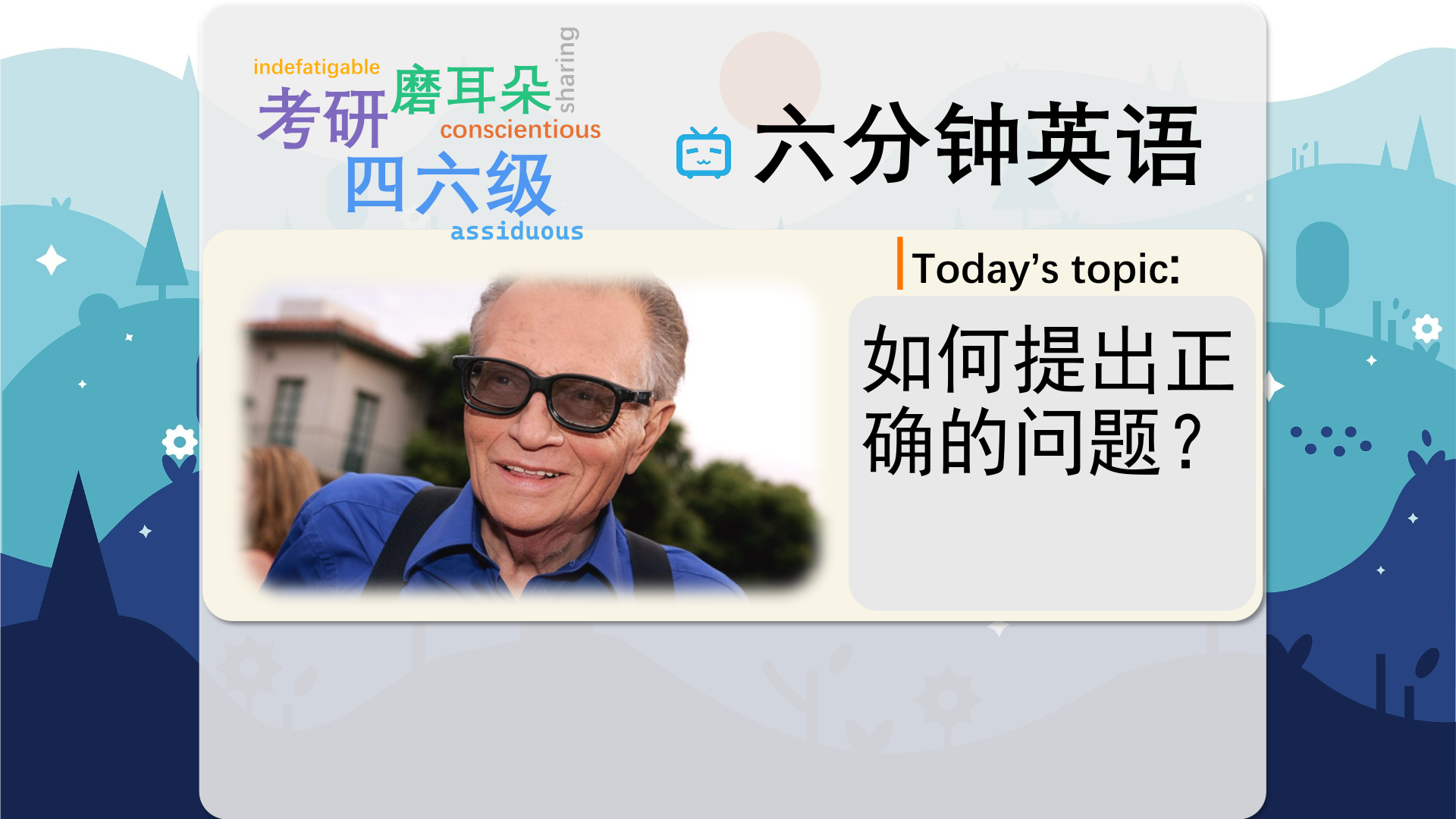
【英文脚本】
Neil
Hello and welcome to 6 Minute English. I’m Neil…
Alice
… and I’m Alice. Now Neil, I’m a big fan of chat shows, as you know. But what do you think makes a good interview?
Neil
I like it when the interviewer asks a question that catches the guest off guard. You know, to surprise them so they’re embarrassed and don’t know what to say.
Alice
That’s not very nice!
Neil
I know. But it’s great TV. That’s what chat shows are all about, isn’t it?
Alice
Well, I don’t agree, Neil! A chat show, by the way, is a TV or radio programme where a host – the person who presents the show, talks to guest celebrities about various topics. And what makes a good interview is the subject of today’s show.
Neil
So what’s a good interview technique, Alice?
Alice
Well, asking open questions, questions the celebrities can’t easily respond to with a short answer. Open questions give them the chance to talk and possibly reveal some juicy details about themselves!
Neil
Juicy details means information you find interesting because it’s exciting or shocking.
Alice
Yes. So let’s test your interviewing skills, Neil. Ask me something, see if you can get some juicy details.
Neil
OK… Hmm… How much do you weigh?
Alice
How much do I weigh?
Neil
Yeah.
Alice
How much do you weigh? Look, that’s a closed question, you’re going to get a short answer and no juicy details! And more importantly, Neil, it’s a rude question!
Neil
OK, bad choice. Sorry. But your reaction was juicy, you got pretty hot under the collar, and that means embarrassed or angry! I’ll try to think of a better question to ask you before the end of the show.
Alice
Alright then. Now, since you aren’t good at asking questions, perhaps you can answer one instead. Who developed a method of questioning around two and a half thousand years ago that aims to discover hidden truths? Was it… a) Hippocrates? b) Socrates? Or c) Aristotle?
Neil
Well, I don’t know much about ancient history so I’m going to guess c) Aristotle.
Alice
Well, we’ll find out if you picked the right answer later on, but now let’s listen to Larry King talking about the secret of his successful career as a TV chat show host. Can you spot a word that means to get or produce?
Larry King, TV chat show host, US
If you ask good questions and you elicit thoughtful answers then you learn more about the person. If the interview’s hard, if I begin by saying, ‘Why did you do that?’ I’d make you defensive. That may be thrilling television, but you don’t learn a lot. I learned that the more I drew back, asked good questions, listened to the answers, cared about the guest … you make the camera disappear.
Neil
The word Larry King used is… elicit.
Alice
Right. And you elicited a defensive reaction from me when you asked a not very thoughtful question about my weight. Defensive means protecting yourself from criticism or attack.
Neil
OK, I wouldn’t make a good chat show host then.
Alice
You’re right there. So good interviewers draw back, or move away, from being the centre of attention. They’re good listeners and care about their guests. Sound familiar?
Neil
Are you suggesting that you’re a good interviewer?
Alice
Yup.
Neil
OK, well, so why aren’t you a top chat show host, hmm? What does Larry mean when he says you have to make the camera disappear?
Alice
It means to make the conversation real, as if you were chatting with a friend, rather than performing to a TV audience. But let’s hear more from Larry King on the secret of his success.
Larry King, TV chat show host, US
I don’t want a ‘no’. I don’t want a ‘yes’. I want a ‘why’. So in other words, I want to be a little kind of dumb. My friend Herbie said the secret of my success is being dumb. ‘What do you mean by that?’
Neil
So you have to ask dumb, or stupid, questions to make a great chat show host! I knew it!
Alice
Maybe there’s hope for you yet, Neil.
Neil
Charming.
Alice
Lovely. OK, here’s the answer to today’s quiz question. I asked: Who developed a method of questioning around two and a half thousand years ago that aims to discover hidden truths? Was it… a) Hippocrates? b) Socrates? Or c) Aristotle?
Neil
And I said c) Aristotle.
Alice
No, it was b) Socrates. All three were famous Greek philosophers but Socrates was the one who angered lots of important people by his probing, or investigative, questions, and this technique is called Socratic Dialogue. Socrates lived from 469 to 399 BC and he influenced philosophy so much that all previous thinkers have come to be known as Pre-Socratic. Despite this he declared “All I know is that I know nothing”.
Neil
Very noble. OK, a final question for you, Alice. What makes you happy?
Alice
Working with such a fantastic co-presenter, Neil.
Neil
That’s nice! I’m embarrassed now.
Alice
Can you tell us the words we heard today?
Neil
Of course! catch somebody off guard chat show host open questions juicy details closed question hot under the collar elicit defensive draw back make the camera disappear dumb probing
Alice
Well, that’s the end of today’s 6 Minute English. Please join us again soon.
Neil
Yes, do indeed!
Both
Bye.
【中英文双语脚本】
Neil(尼尔)
Hello and welcome to 6 Minute English. I’m Neil…
您好,欢迎来到 6 Minute English。我是 Neil…
Alice(爱丽丝)
… and I’m Alice. Now Neil, I’m a big fan of chat shows, as you know. But what do you think makes a good interview?
…我是 Alice。现在 Neil,正如你所知,我是聊天节目的忠实粉丝。但是,您认为什么是好的采访呢?
Neil(尼尔)
I like it when the interviewer asks a question that catches the guest off guard. You know, to surprise them so they’re embarrassed and don’t know what to say.
我喜欢面试官问一个让客人措手不及的问题。你知道的,为了给他们一个惊喜,让他们感到尴尬,不知道该说什么。
Alice(爱丽丝)
That’s not very nice!
那不是很好!
Neil(尼尔)
I know. But it’s great TV. That’s what chat shows are all about, isn’t it?
我知道。但这是很棒的电视。这就是聊天节目的意义所在,不是吗?
Alice(爱丽丝)
Well, I don’t agree, Neil! A chat show, by the way, is a TV or radio programme where a host – the person who presents the show, talks to guest celebrities about various topics. And what makes a good interview is the subject of today’s show.
好吧,我不同意,尼尔!顺便说一句,聊天节目是一个电视或广播节目,主持人 —— 主持节目的人 —— 与嘉宾名人谈论各种话题。什么是好的采访是今天节目的主题。
Neil(尼尔)
So what’s a good interview technique, Alice?
那么,什么是好的采访技巧呢,Alice?
Alice(爱丽丝)
Well, asking open questions, questions the celebrities can’t easily respond to with a short answer. Open questions give them the chance to talk and possibly reveal some juicy details about themselves!
好吧,提出开放性问题,名人无法轻易用简短的回答来回答的问题。开放式问题让他们有机会交谈,并可能透露一些关于自己的有趣细节!
Neil(尼尔)
Juicy details means information you find interesting because it’s exciting or shocking.
多汁的细节意味着您觉得有趣的信息,因为它令人兴奋或令人震惊。
Alice(爱丽丝)
Yes. So let’s test your interviewing skills, Neil. Ask me something, see if you can get some juicy details.
是的。所以,让我们测试一下你的面试技巧,Neil。问我一些事情,看看你是否能得到一些有趣的细节。
Neil(尼尔)
OK… Hmm… How much do you weigh?
还行。。。嗯。。。你的体重是多少?
Alice(爱丽丝)
How much do I weigh?
我的体重是多少?
Neil(尼尔)
Yeah.
是的。
Alice(爱丽丝)
How much do you weigh? Look, that’s a closed question, you’re going to get a short answer and no juicy details! And more importantly, Neil, it’s a rude question!
你的体重是多少?看,这是一个封闭的问题,你会得到一个简短的答案,没有多汁的细节!更重要的是,尼尔,这是一个粗鲁的问题!
Neil(尼尔)
OK, bad choice. Sorry. But your reaction was juicy, you got pretty hot under the collar, and that means embarrassed or angry! I’ll try to think of a better question to ask you before the end of the show.
好吧,糟糕的选择。不好意思。但是你的反应是多汁的,你的衣领下很热,这意味着尴尬或生气!我会试着在节目结束前想出一个更好的问题来问你。
Alice(爱丽丝)
Alright then. Now, since you aren’t good at asking questions, perhaps you can answer one instead. Who developed a method of questioning around two and a half thousand years ago that aims to discover hidden truths? Was it… a) Hippocrates? b) Socrates? Or c) Aristotle?
好吧。现在,既然你不擅长提问,也许你可以回答一个问题。谁在大约两千五百年前发明了一种旨在发现隐藏真相的提问方法?是不是……a) 希波克拉底?b) 苏格拉底?或者 c) 亚里士多德?
Neil(尼尔)
Well, I don’t know much about ancient history so I’m going to guess c) Aristotle.
嗯,我对古代历史了解不多,所以我猜 c) 亚里士多德。
Alice(爱丽丝)
Well, we’ll find out if you picked the right answer later on, but now let’s listen to Larry King talking about the secret of his successful career as a TV chat show host. Can you spot a word that means to get or produce?
好吧,我们稍后会发现您是否选择了正确的答案,但现在让我们听听 Larry King 谈论他作为电视聊天节目主持人的成功职业生涯的秘诀。你能找出一个意思是 get 或 produce 的词吗?
Larry King, TV chat show host, US(LarryKing,美国电视聊天节目主持人)
If you ask good questions and you elicit thoughtful answers then you learn more about the person. If the interview’s hard, if I begin by saying, ‘Why did you do that?’ I’d make you defensive. That may be thrilling television, but you don’t learn a lot. I learned that the more I drew back, asked good questions, listened to the answers, cared about the guest … you make the camera disappear.
如果你提出好问题并得到深思熟虑的答案,那么你就会更多地了解这个人。如果采访很难,如果我一开始就说,’你为什么这样做?我会让你防御。这可能是激动人心的电视节目,但你学到的东西并不多。我学到,我越退后一步,问好问题,倾听答案,关心房客……你让相机消失。
Neil(尼尔)
The word Larry King used is… elicit.
Larry King 使用的词是……引出。
Alice(爱丽丝)
Right. And you elicited a defensive reaction from me when you asked a not very thoughtful question about my weight. Defensive means protecting yourself from criticism or attack.
好的。当你问了一个关于我体重的不太深思熟虑的问题时,你引起了我的防御反应。防御意味着保护自己免受批评或攻击。
Neil(尼尔)
OK, I wouldn’t make a good chat show host then.
好吧,那我不会成为一个好的聊天节目主持人。
Alice(爱丽丝)
You’re right there. So good interviewers draw back, or move away, from being the centre of attention. They’re good listeners and care about their guests. Sound familiar?
你就在那儿。因此,优秀的采访者会远离或远离关注的焦点。他们是很好的倾听者,关心他们的客人。听起来很熟悉?
Neil(尼尔)
Are you suggesting that you’re a good interviewer?
你是在暗示你是一个好的面试官吗?
Alice(爱丽丝)
Yup.
是的。
Neil(尼尔)
OK, well, so why aren’t you a top chat show host, hmm? What does Larry mean when he says you have to make the camera disappear?
好吧,那么你为什么不成为顶级聊天节目主持人,嗯?当 Larry 说你必须让相机消失时,他是什么意思?
Alice(爱丽丝)
It means to make the conversation real, as if you were chatting with a friend, rather than performing to a TV audience. But let’s hear more from Larry King on the secret of his success.
它的意思是让对话变得真实,就像你在和朋友聊天一样,而不是向电视观众表演。但是,让我们听听 Larry King 更多地讲述他成功的秘诀。
Larry King, TV chat show host, US(LarryKing,美国电视聊天节目主持人)
I don’t want a ‘no’. I don’t want a ‘yes’. I want a ‘why’. So in other words, I want to be a little kind of dumb. My friend Herbie said the secret of my success is being dumb. ‘What do you mean by that?’
我不想要一个’不’。我不想要一个“是”。我想要一个“为什么”。所以换句话说,我想做个小笨蛋。我的朋友 Herbie 说我成功的秘诀是愚蠢。“你这话是什么意思?”
Neil(尼尔)
So you have to ask dumb, or stupid, questions to make a great chat show host! I knew it!
所以你必须问愚蠢或愚蠢的问题才能成为一名出色的聊天节目主持人!我就知道!
Alice(爱丽丝)
Maybe there’s hope for you yet, Neil.
也许你还有希望,尼尔。
Neil(尼尔)
Charming.
迷人。
Alice(爱丽丝)
Lovely. OK, here’s the answer to today’s quiz question. I asked: Who developed a method of questioning around two and a half thousand years ago that aims to discover hidden truths? Was it… a) Hippocrates? b) Socrates? Or c) Aristotle?
可爱。好的,这是今天测验问题的答案。我问道:谁在大约两千五千年前发明了一种旨在发现隐藏真相的提问方法?是不是……a) 希波克拉底?b) 苏格拉底?或者 c) 亚里士多德?
Neil(尼尔)
And I said c) Aristotle.
我说 c) 亚里士多德。
Alice(爱丽丝)
No, it was b) Socrates. All three were famous Greek philosophers but Socrates was the one who angered lots of important people by his probing, or investigative, questions, and this technique is called Socratic Dialogue. Socrates lived from 469 to 399 BC and he influenced philosophy so much that all previous thinkers have come to be known as Pre-Socratic. Despite this he declared “All I know is that I know nothing”.
不,是 b) 苏格拉底。这三位都是著名的希腊哲学家,但苏格拉底是那个通过探究或调查问题激怒许多重要人物的人,这种技巧被称为苏格拉底对话。苏格拉底生活在公元前 469 年至公元前 399 年之间,他对哲学的影响如此之大,以至于所有以前的思想家都被称为前苏格拉底。尽管如此,他还是宣称“我所知道的就是我什么都不知道”。
Neil(尼尔)
Very noble. OK, a final question for you, Alice. What makes you happy?
非常高尚。好的,最后一个问题要问你,Alice。什么让您快乐?
Alice(爱丽丝)
Working with such a fantastic co-presenter, Neil.
与如此出色的联合主持人 Neil 合作。
Neil(尼尔)
That’s nice! I’m embarrassed now.
那很好!我现在很尴尬。
Alice(爱丽丝)
Can you tell us the words we heard today?
您能告诉我们今天听到的话语吗?
Neil(尼尔)
Of course! catch somebody off guard chat show host open questions juicy details closed question hot under the collar elicit defensive draw back make the camera disappear dumb probing
答案是肯定的!抓住某人 措手不及 聊天节目主持人 开放性问题 多汁的细节 封闭式问题 热 衣领下 引出 防御性 回撤 使摄像机消失 愚蠢的探测
Alice(爱丽丝)
Well, that’s the end of today’s 6 Minute English. Please join us again soon.
好了,今天的六分钟 English 到此结束。请尽快再次加入我们。
Neil(尼尔)
Yes, do indeed!
是的,确实如此!
Both(双)
Bye.
再见。

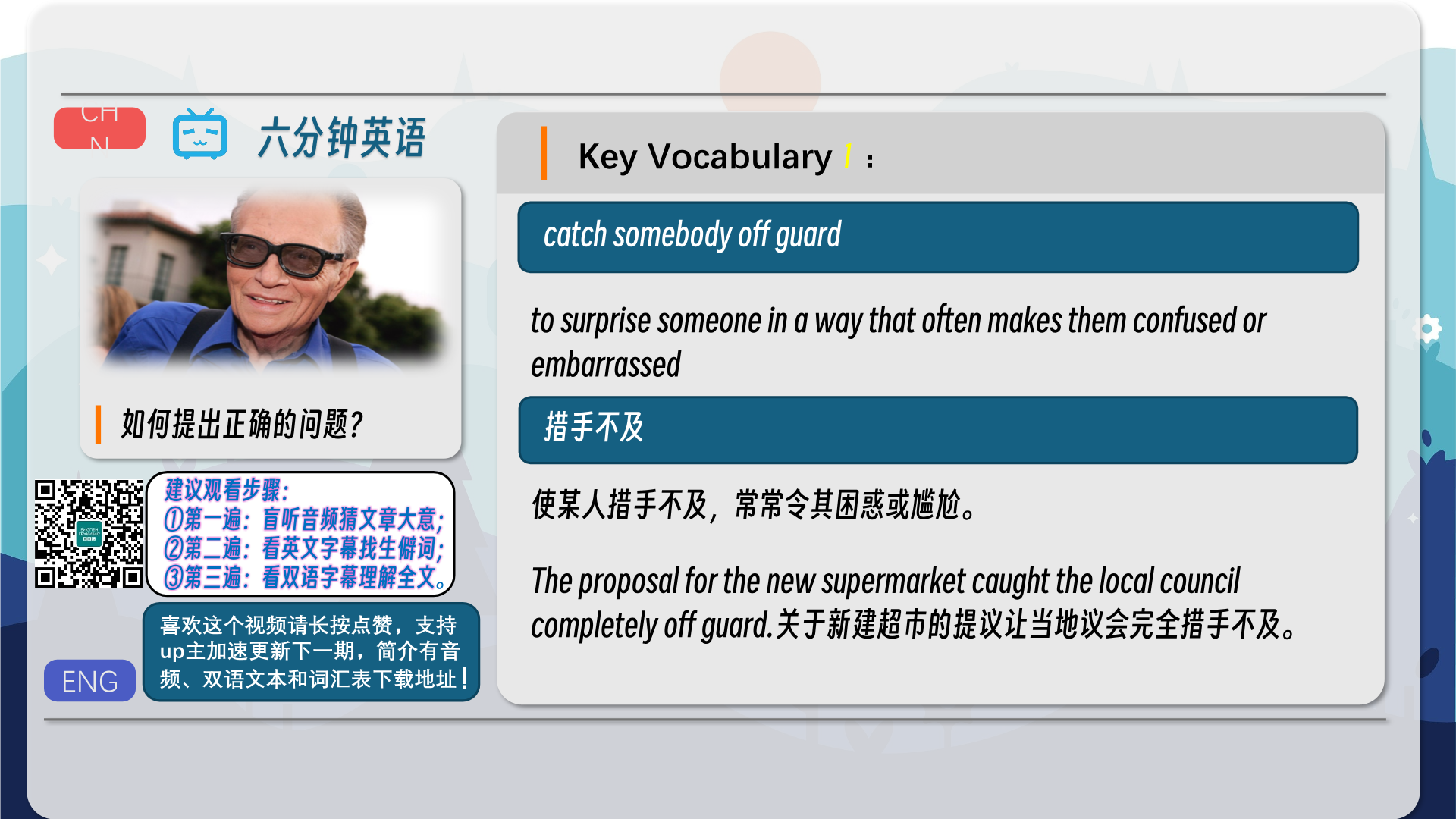
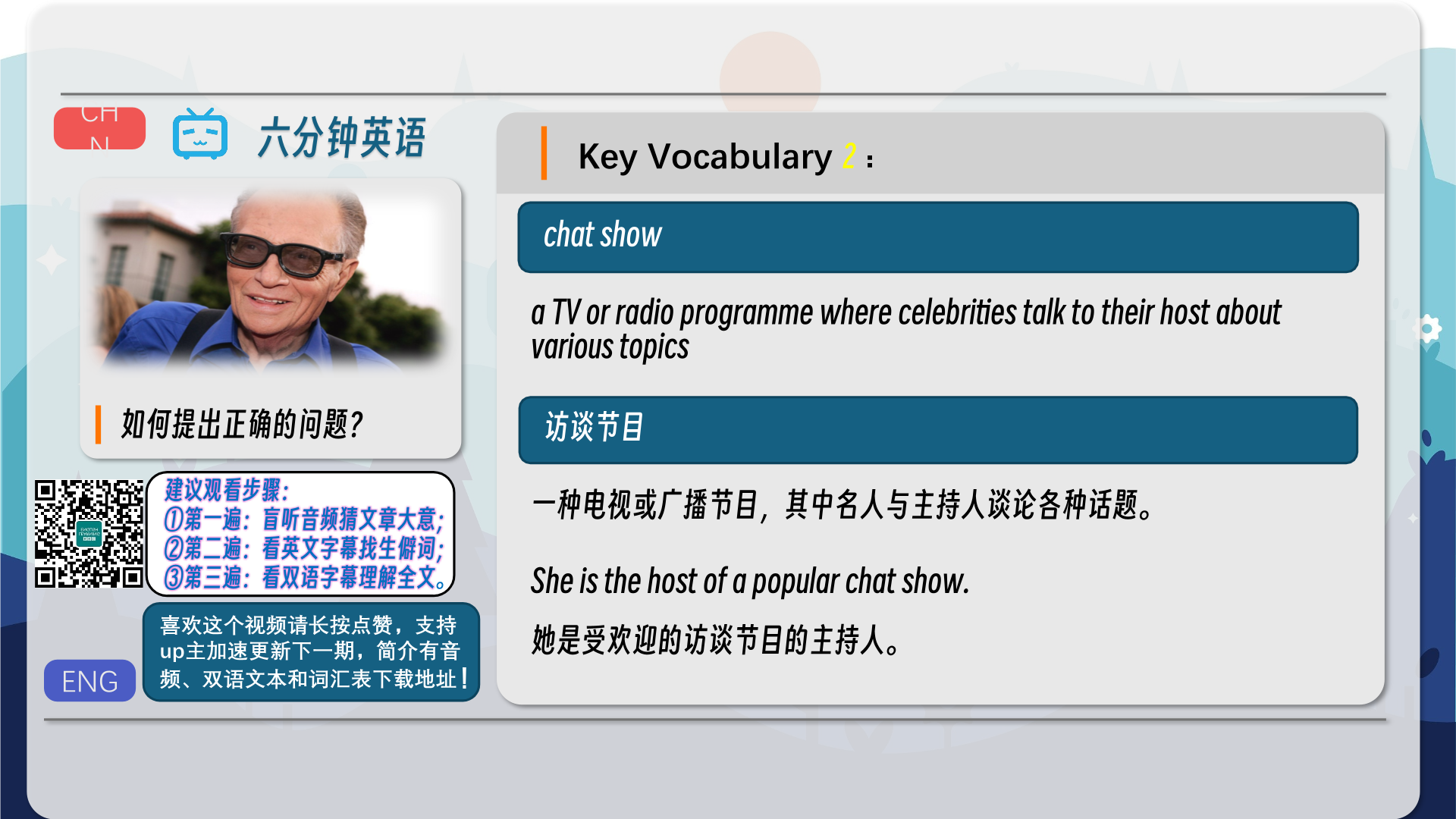
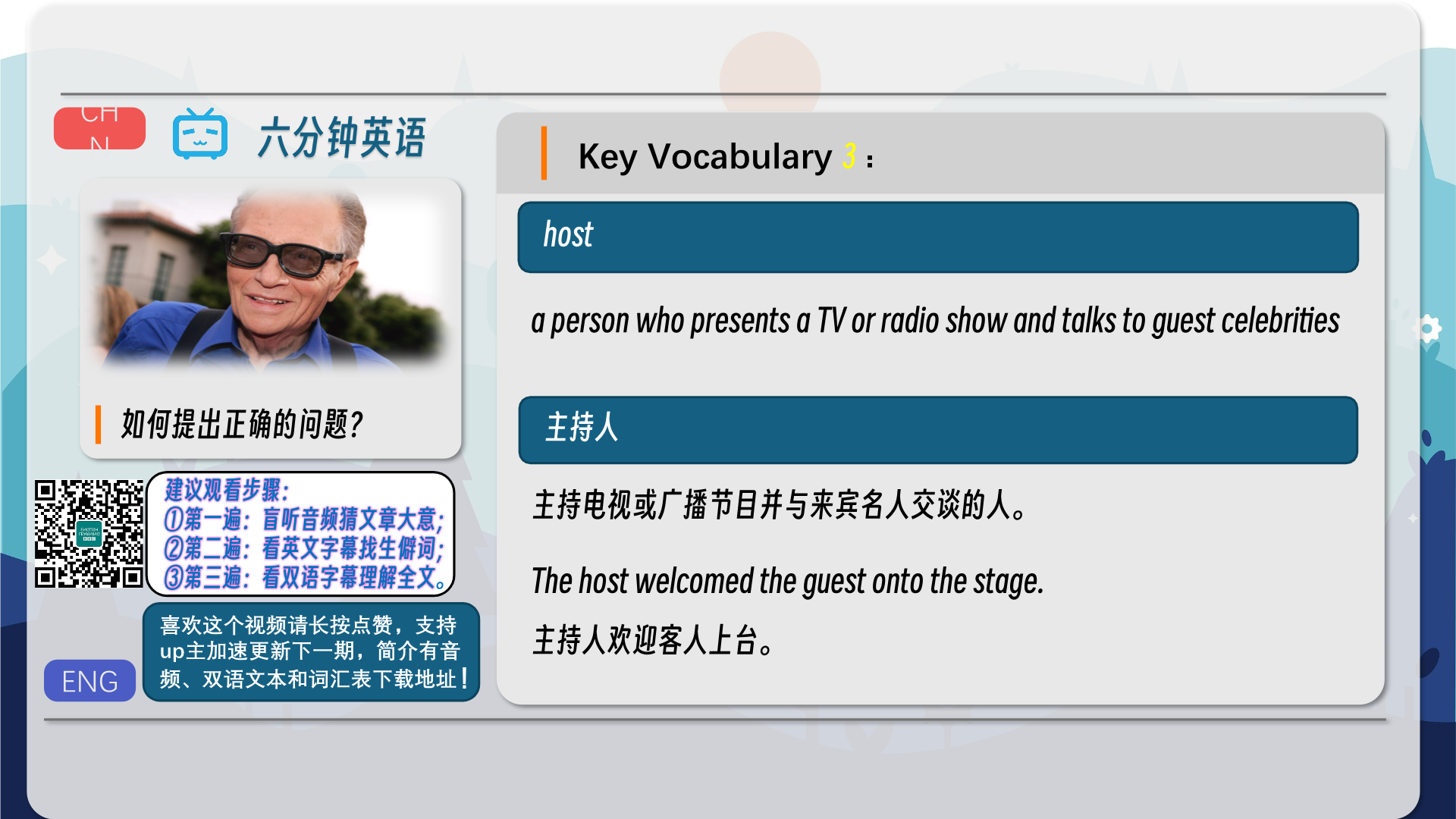
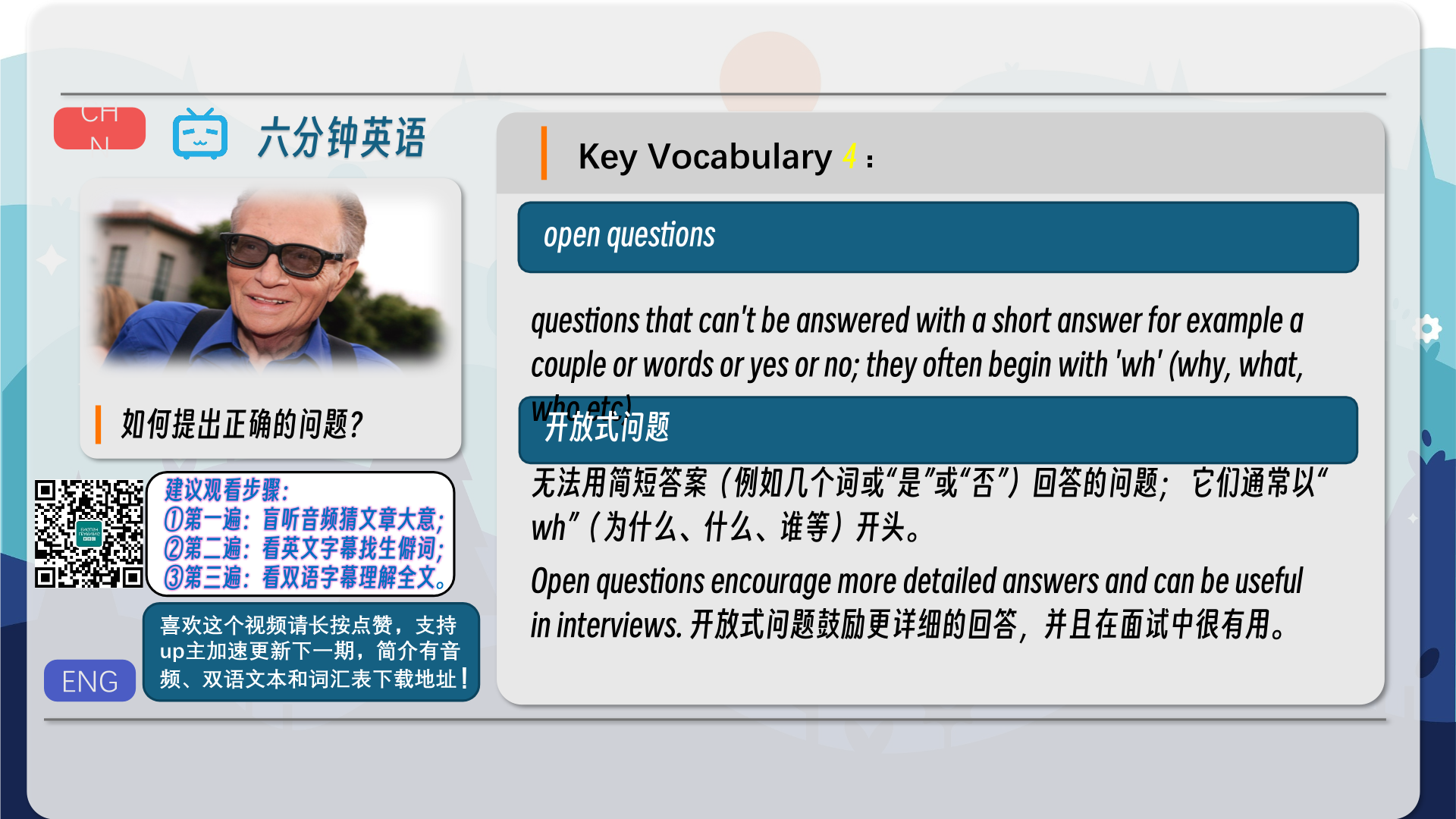
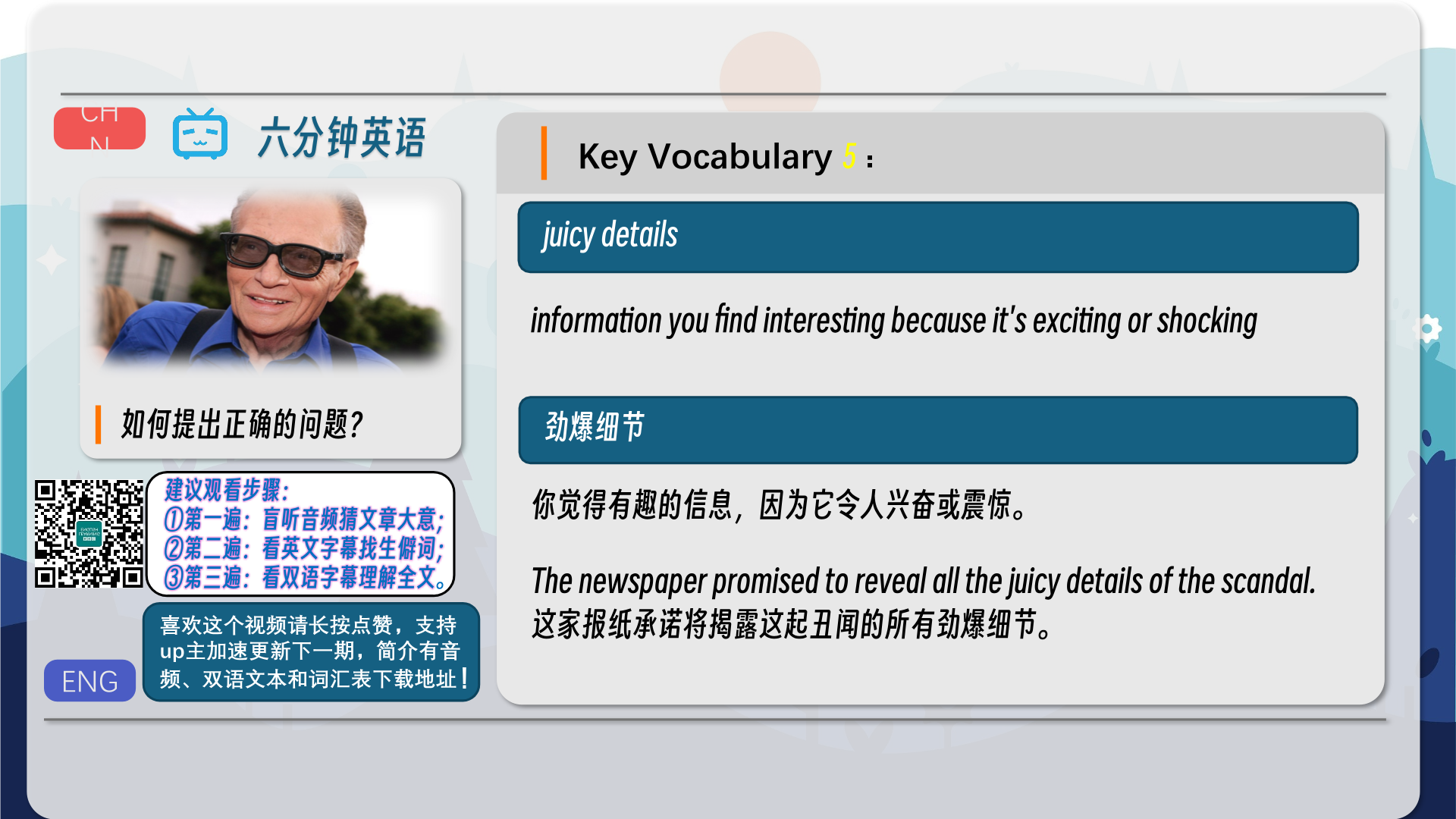
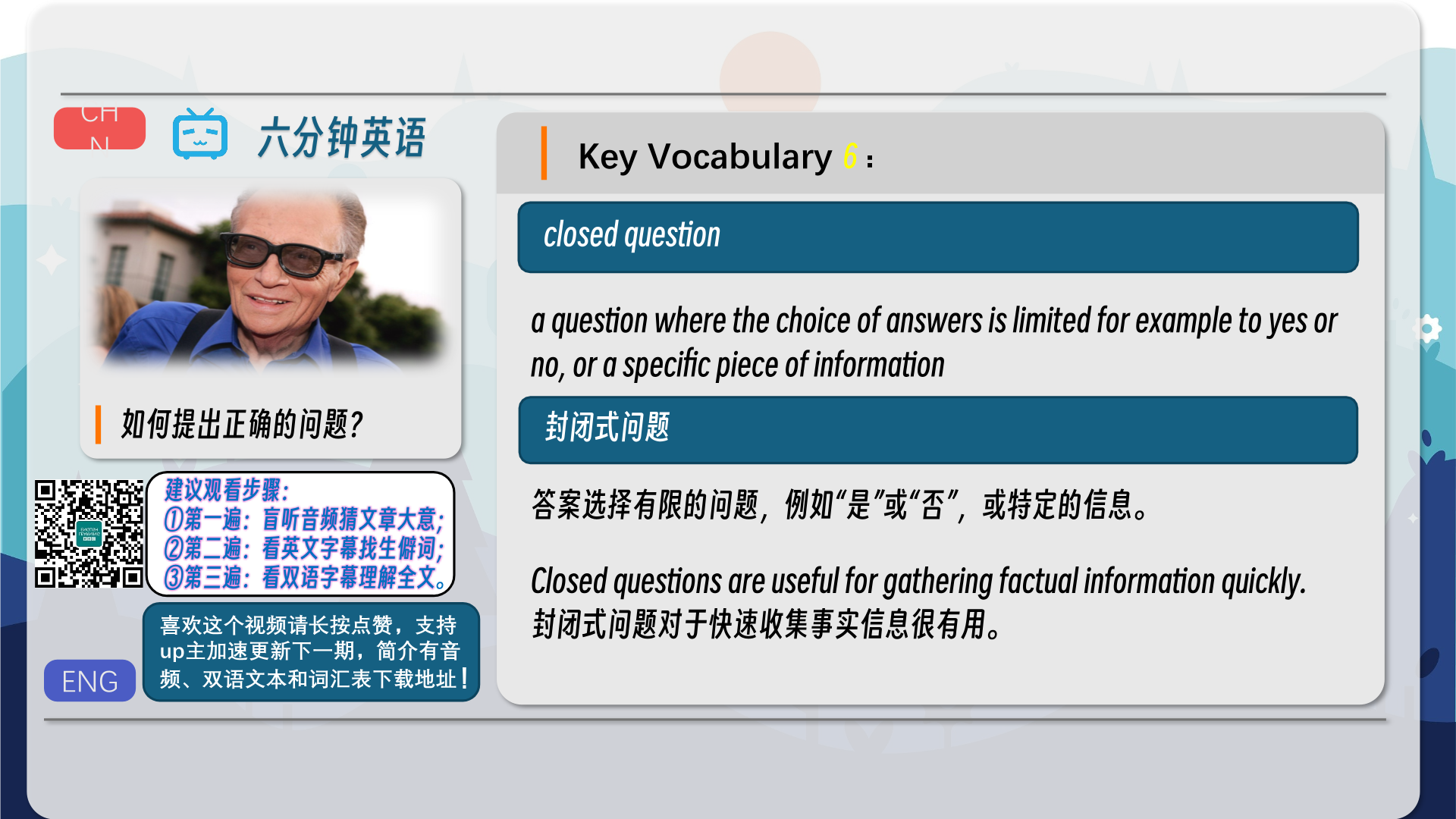
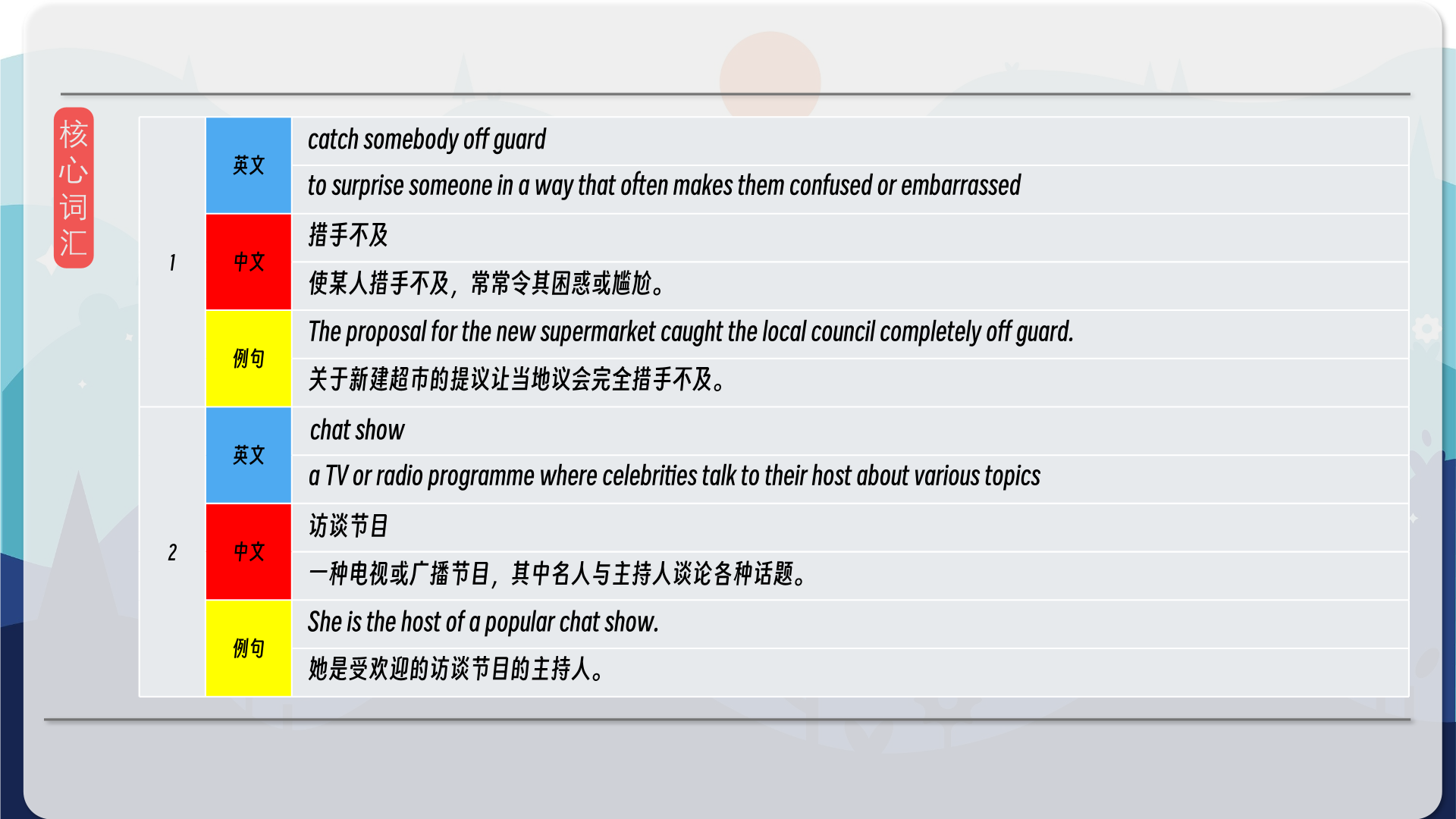
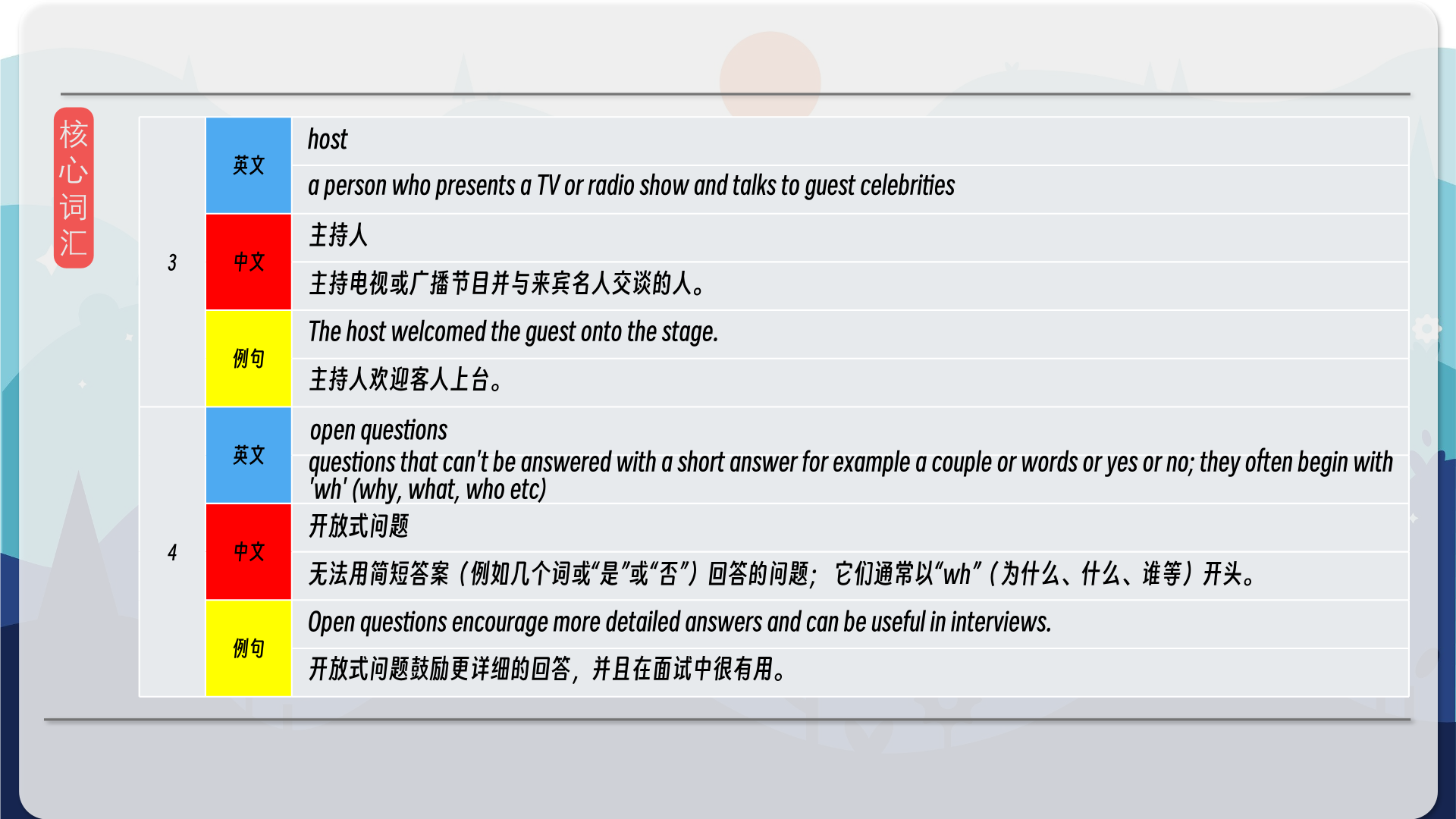
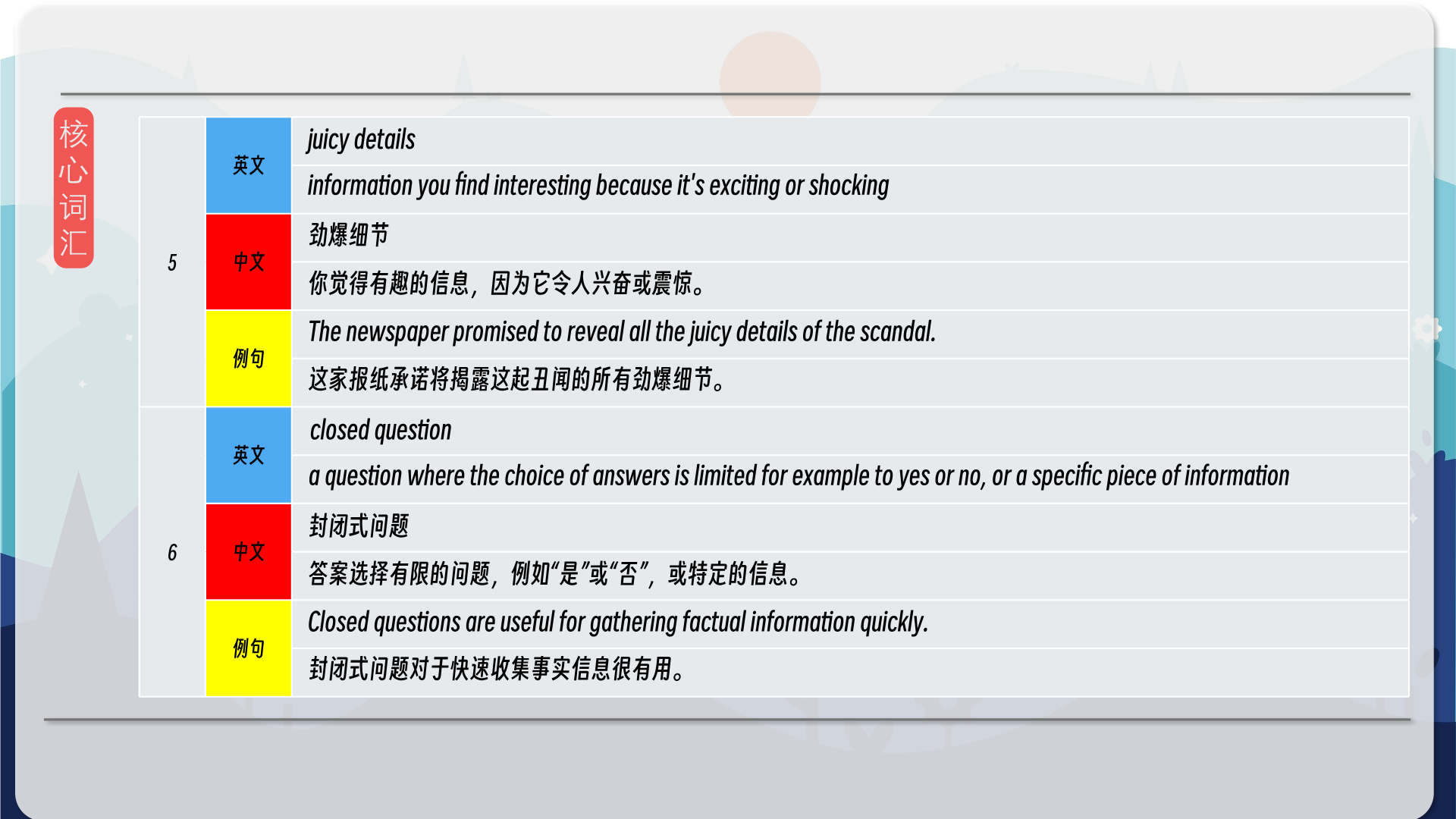
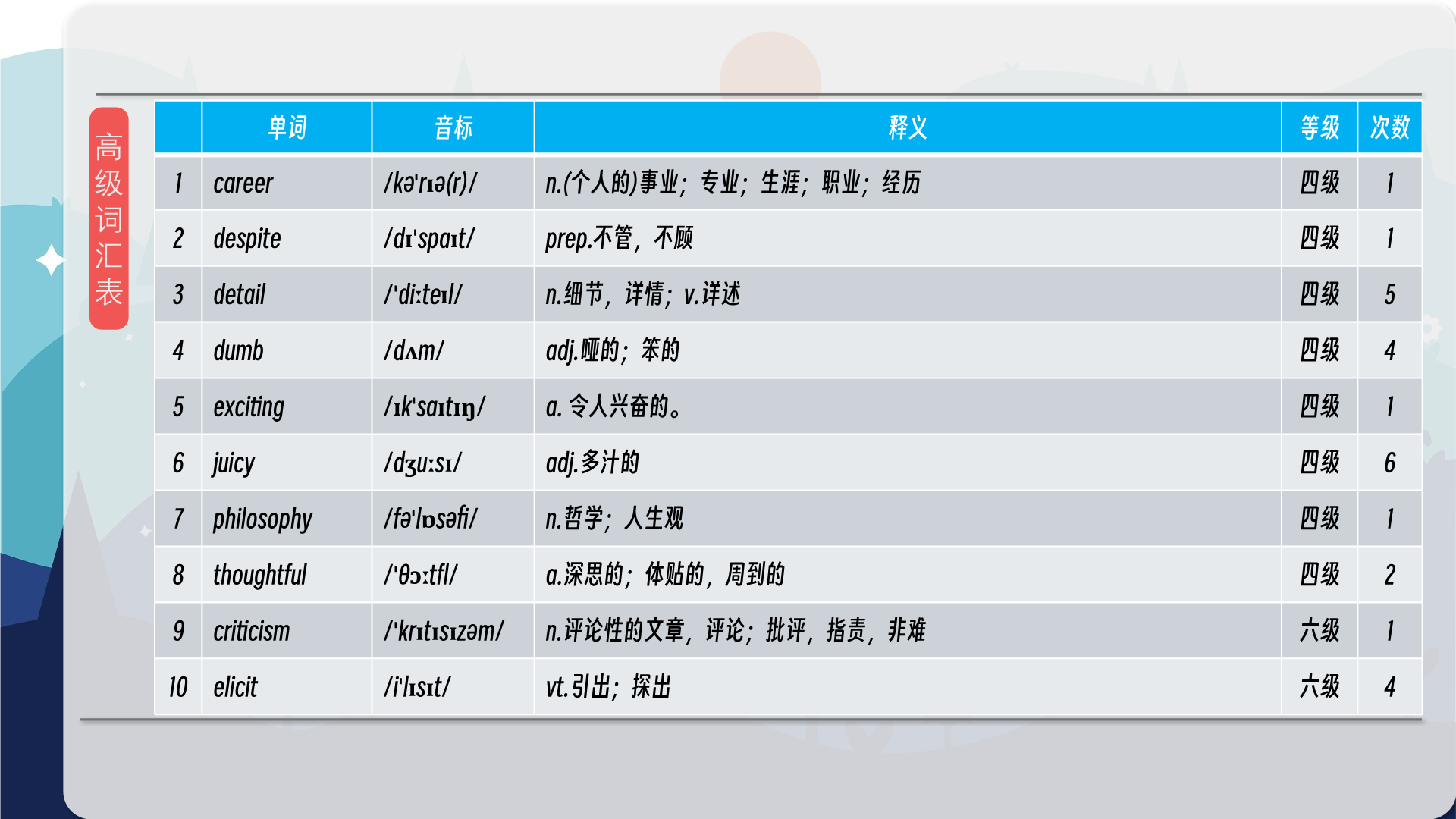
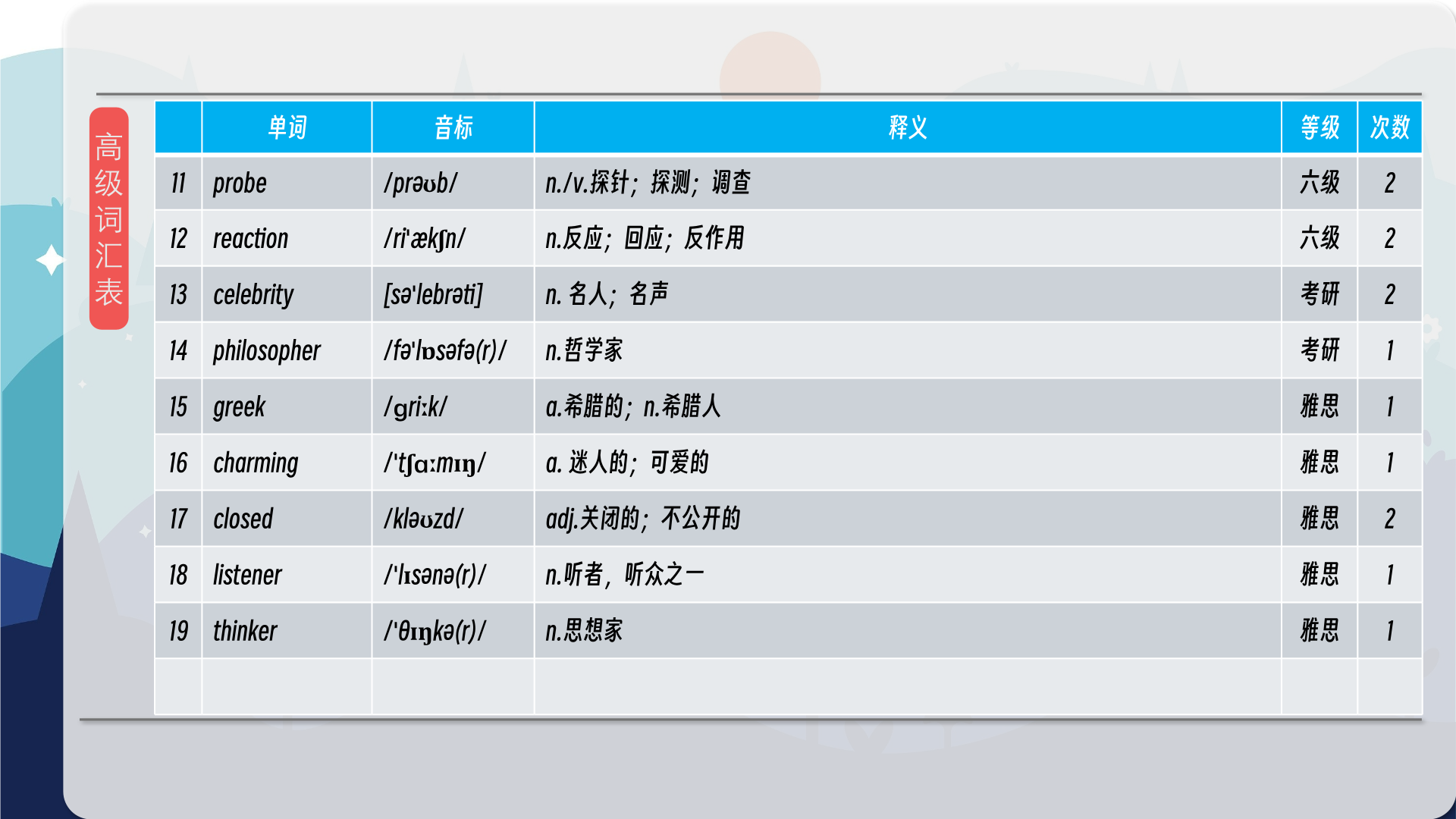

【核心词汇】
catch somebody off guard
to surprise someone in a way that often makes them confused or embarrassed
措手不及
使某人措手不及,常常令其困惑或尴尬。
The proposal for the new supermarket caught the local council completely off guard.
关于新建超市的提议让当地议会完全措手不及。
chat show
a TV or radio programme where celebrities talk to their host about various topics
访谈节目
一种电视或广播节目,其中名人与主持人谈论各种话题。
She is the host of a popular chat show.
她是受欢迎的访谈节目的主持人。
host
a person who presents a TV or radio show and talks to guest celebrities
主持人
主持电视或广播节目并与来宾名人交谈的人。
The host welcomed the guest onto the stage.
主持人欢迎客人上台。
open questions
questions that can’t be answered with a short answer for example a couple or words or yes or no; they often begin with ‘wh’ (why, what, who etc)
开放式问题
无法用简短答案(例如几个词或“是”或“否”)回答的问题; 它们通常以“wh”(为什么、什么、谁等)开头。
Open questions encourage more detailed answers and can be useful in interviews.
开放式问题鼓励更详细的回答,并且在面试中很有用。
juicy details
information you find interesting because it’s exciting or shocking
劲爆细节
你觉得有趣的信息,因为它令人兴奋或震惊。
The newspaper promised to reveal all the juicy details of the scandal.
这家报纸承诺将揭露这起丑闻的所有劲爆细节。
closed question
a question where the choice of answers is limited for example to yes or no, or a specific piece of information
封闭式问题
答案选择有限的问题,例如“是”或“否”,或特定的信息。
Closed questions are useful for gathering factual information quickly.
封闭式问题对于快速收集事实信息很有用。
在公众号里输入6位数字,获取【对话音频、英文文本、中文翻译、核心词汇和高级词汇表】电子档,6位数字【暗号】在文章的最后一张图片,如【220728】,表示22年7月28日这一期。公众号没有的文章说明还没有制作相关资料。年度合集在B站【六分钟英语】工房获取,每年共计300+文档,感谢支持!